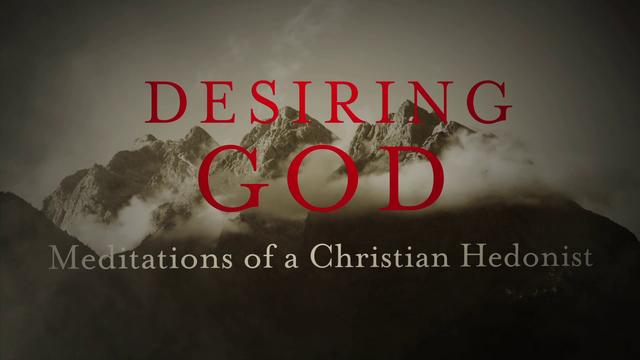
by Bret Capranica | Jul 15, 2015 | Christian Living, General Theology, The Gospel
Each Wednesday evening through the summer months, a group of adults are reading through and discussing the implications of John Piper’s book, Desiring God. If you have opportunity, come join us each Wednesday, 6:30 p.m. at Summit Woods Baptist Church. Here are a few highlights from chapter two. God’s pursuit of praise from us and our pursuit of pleasure in Him are one and the same pursuit. God’s quest to be glorified and our quest to be satisfied reach their goal in this one experience: our delight in God, which overflows in praise. …no one is a Christian who does not embrace Jesus gladly as his most valued treasure, and then pursue the fullness of that joy in Christ that honors Him. The best explanation of Romans 3:23 is Romans 1:23. It says that those who did not glorify or thank God became fools “and exchanged the glory of the immortal God for images.” This is the way we “fall short” of the glory of God: We exchange it for something of lesser value. All sin comes from not putting supreme value on the glory of God—this is the very essence of sin. The wickedness of sin is owing to the implicit disdain for God. Quoting Jonathan Edwards: Our obligation to love, honor, and obey any being is in proportion to his loveliness, honorableness, and authority.… But God is a being infinitely lovely, because he hath infinite excellency and beauty.… So sin against God, being a violation of infinite obligations, must be a crime infinitely heinous, and so deserving infinite punishment.… The eternity of the punishment of...

by Bret Capranica | Jul 11, 2015 | Christian Living, General Theology, Jonathan Edwards
In preparation of my own heart for preaching a second message on the psalms, I perused one of Jonathan Edwards’ sermons on Psalm 89:6. It is entitled, “God’s Excellencies.” I recommend a read of the whole sermon. It details how God, and his specific attributes of excellence, should motivate us to respond to him in repentance and in worship. Below is merely a few excerpts that might prove helpful as God’s people prepare to gather together to worship God in his excellency on the Lord’s Day. For who in the heaven can be compared unto the Lord, and who among the sons of the mighty can be likened unto the Lord? Psalms 89:6 This book of Psalms has such an exalted devotion, and such a spirit of evangelical grace every[where] breathed forth in it! Here are such exalted expressions of the gloriousness of God, and even of the excellency of Christ and his kingdom; there is so much of the gospel doctrine, grace, and spirit, breaking out and shining in it, that it seems to be carried clear above and beyond the strain and pitch of the Old Testament, and almost brought up to the New. Almost the whole book of Psalms has either a direct or indirect respect to Christ and the gospel which he was to publish… The infinite excellency, greatness, and glory of God is the foundation of all religion, for except we believe the perfections of God, we shall never worship him and love him as he ought to be worshipped and loved; except we believe his power and justice and holiness, we shall not...

by Bret Capranica | Jul 8, 2015 | General Theology, Reading, The Gospel
The following are a number of significant quotes from John Piper’s seminal book, Desiring God. All of these are from chapter one; the chapter our church is discussing during our Mid-Week Fellowship tonight. I put a few of my thoughts in brackets and italics. Sorry, no page numbers – I’m using my kindle app. The ultimate ground of Christian Hedonism is the fact that God is uppermost in His own affections: The chief end of God is to glorify God and enjoy Himself forever. …we are more accustomed to think about our duty than God’s design. And when we do ask about God’s design, we are too prone to describe it with ourselves at the center of God’s affections. [I would say that we are more accustomed to think about our duty to the exclusion of God’s design; merely thinking on God’s design won’t do the trick either]. God’s saving designs are penultimate, not ultimate….The bedrock foundation of Christian Hedonism is not God’s allegiance to us, but to Himself. [Not to say that God’s saving designs are less important in the grand scheme. But his saving purposes have an end beyond themselves, namely, bringing God glory – and those saving purposes are essential to that end.] “Our God is in the heavens; he does all that he pleases” (Psalm 115:3). The implication of this text is that God has the right and power to do whatever makes Him happy. That is what it means to say that God is sovereign….if none of His purposes can be frustrated, then He must be the happiest of all beings. The hardened disobedience of...

by Bret Capranica | Apr 2, 2014 | Christian Living, General Theology, The Gospel
Here are a few more quotes from Tom Schreiner’s book, The Race Set Before Us: A Biblical Theology of Perseverance and Assurance. I really recommend this book as a helpful tool in understanding the purpose and use of the warnings of the New Testament and how they related to perseverance and eternal security. The Christian life is like a race, and we run to win a prize. Winning this race is the most important matter in our lives. If we lose this race, everything else we achieve in life is meaningless. 46 Two truths stand out in Paul’s assessment of his life. First, he was confident that he had lived in a way that pleased God….Second, the reason for Paul’s assurance was his perseverance in running the race. He had not quit halfway into the race; he had not abandoned the faith. 47 Both the present and future dimensions of salvation should be viewed as two aspects of an indivisible whole….Salvation is not merely a past reality; it is also our future destiny. 47 We are already saved, yet our salvation has not yet been completed or consummated. We must uphold the tension in the New Testament between the already and not yet when we think of salvation in the New Testament. Believers today are prone to oversimplify the biblical teaching and to think of salvation simply in terms of the present. When this happens, a crucial element of biblical teaching is surrendered… 52 If we wish to represent the New Testament correctly, we cannot say that eternal life is exclusively a present or a future...

by Bret Capranica | Jul 18, 2011 | Biblical Studies, Bookreviews, Featured Articles, General Theology, Ordinary Pastor, Video
Cap-Review: The Glory of God from Bret Capranica on Vimeo. An Ordinary Pastor’s Brief Review of The Glory of God: Christopher W. Morgan and Robert A. Peterson have blessed the church with a helpful volume in Crossway”™s “Theology in Community” series, entitled, The Glory of God. The aim of the book is to ask and answer the question, “what does the Bible teach” about God”™s glory (20). The editors seek a two pronged attack in achieving their aim. Chapters 1-6 seek to “help us glorify God in our minds by focusing on biblical and theological truths related to his glory. Chapters 7 and 8 help us rejoice in our hearts as they illuminate how these truths about God”™s glory shape our view and approach to the church, pastoral ministry, and missions” (21). Nine different authors, all instructors at theological institutions, contribute to the volume. The audience is intended to be college and seminary students and those pastors with such training (14). The book is arranged by addressing the subject of God”™s glory historically, then from the perspective of the Old Testament, New Testament, the Synoptic Gospels/Acts/General Epistles, John”™s Gospel/Revelation, and Paul”™s Epistles. The book then contains a chapter on the overall theology of God”™s glory, and concludes with chapters on pastoral and missional implications of God”™s glory. I found the structure and arrangement of the book helpful. Moving from an historical sweep to looking at how God”™s glory is described in detail from the Old Testament through the emphases in various New Testament genre, then to a more global evaluation of the biblical material, ending with more practical implications was...

by Bret Capranica | Jan 16, 2011 | Culture, General Theology
For further reading and more extensive information from tonight’s message on the biblical response to homosexuality, I found the The Fall 2008 issue of The Master’s Seminary Journal helpful. I’ve linked to the pdf copies: “God’s Word on Homosexuality: The Truth about Sin and the reality of Forgiveness,” John MacArthur “Cultural and Medical Myths about Homosexuality,” Michael A. Grisaniti “Marriage and Homosexuality: Toward a Biblical Understanding,” Irvan A. Busenitz “Parenting and Homosexuality,” Richard L. Holland “The Church’s Response to Homosexuality,” Alex D. Montoya Also, much of the material in my message on the biblical term used in the NT for “homosexuality” can be found in the following article: “The Source and NT Meaning of APZENDOKOITAI with Implications for Christian Ethics and Ministry,” James B....













